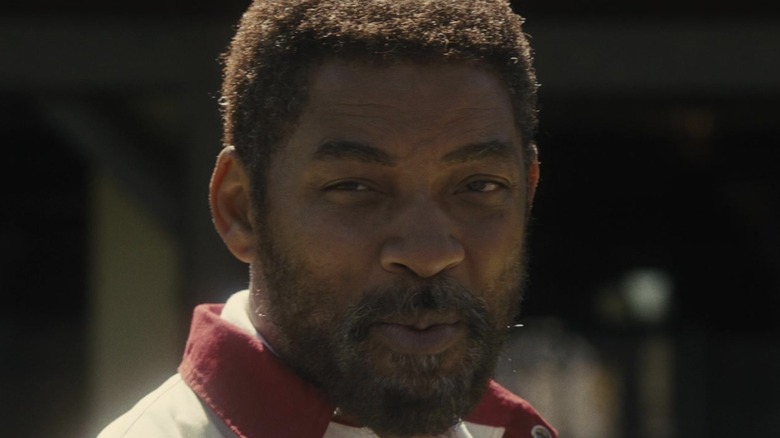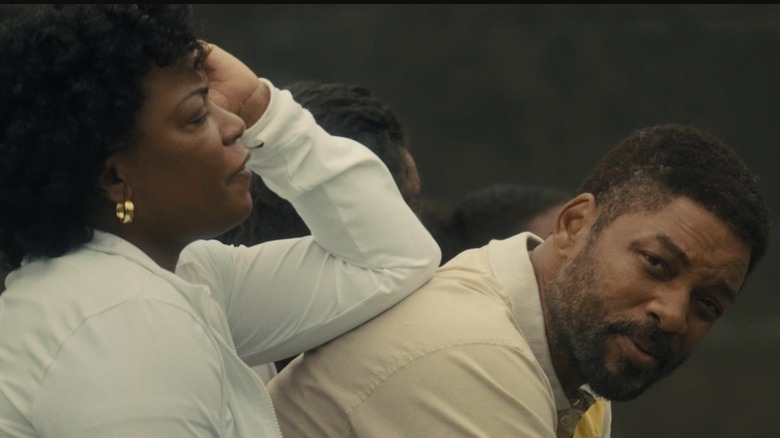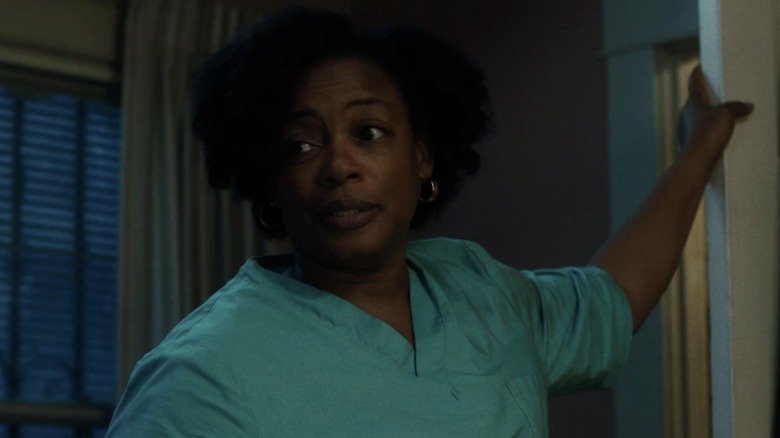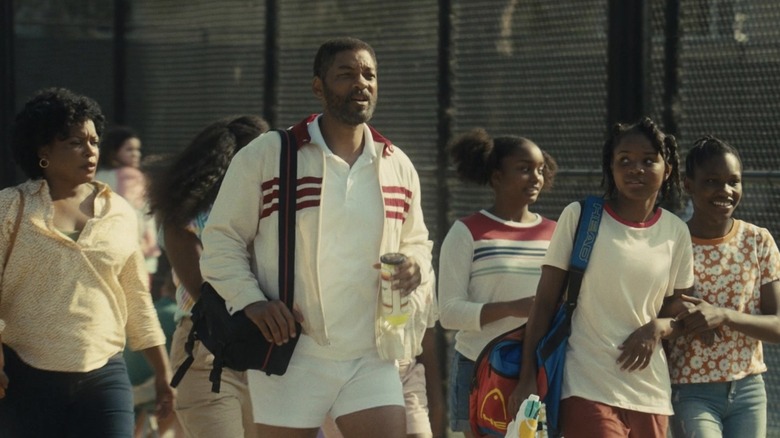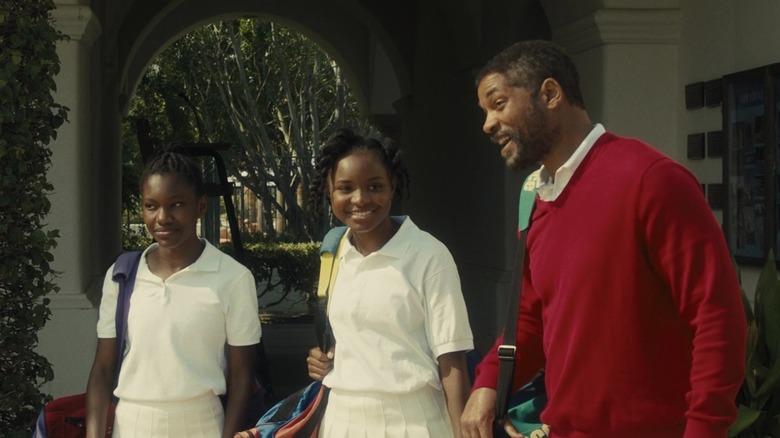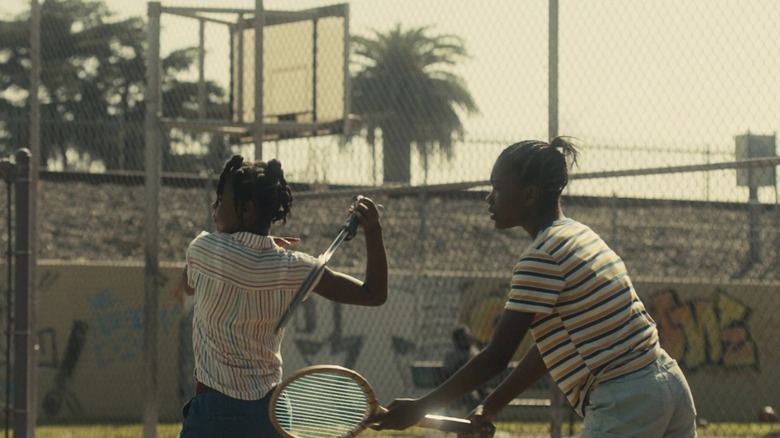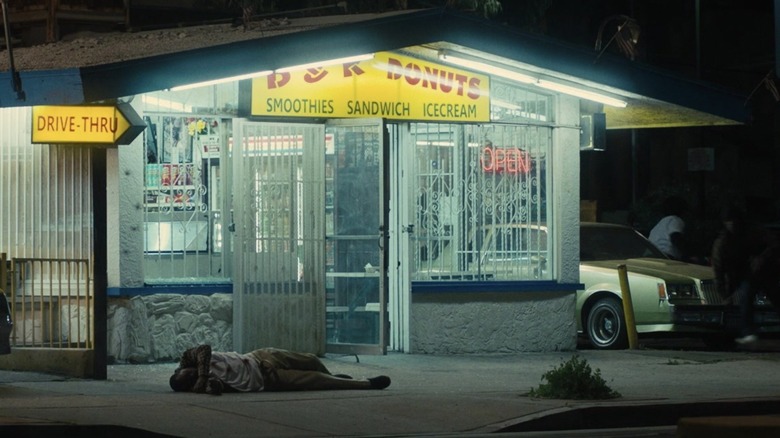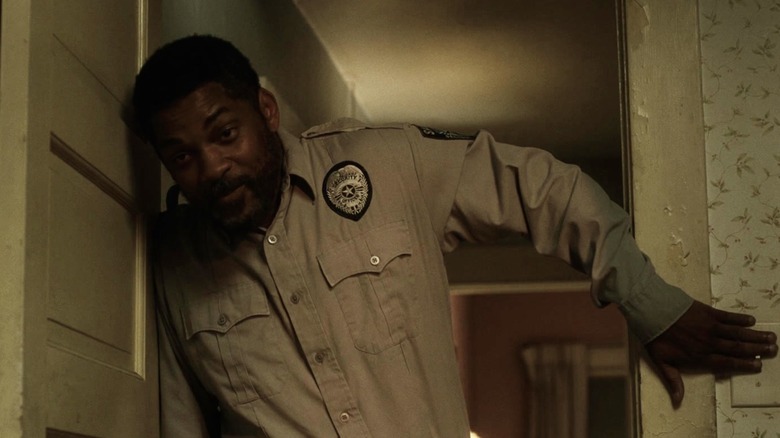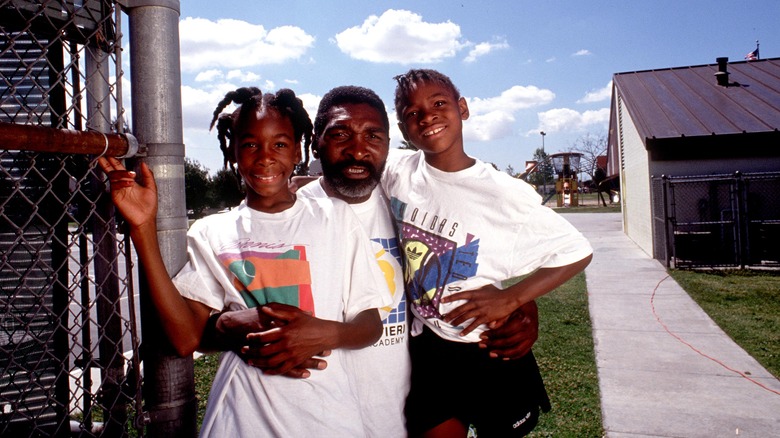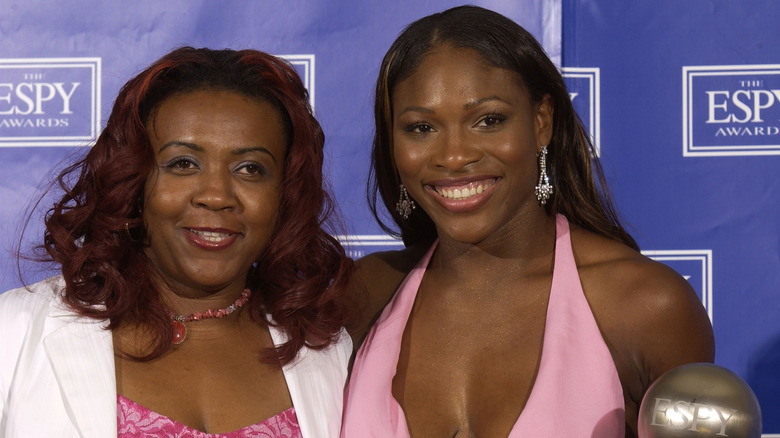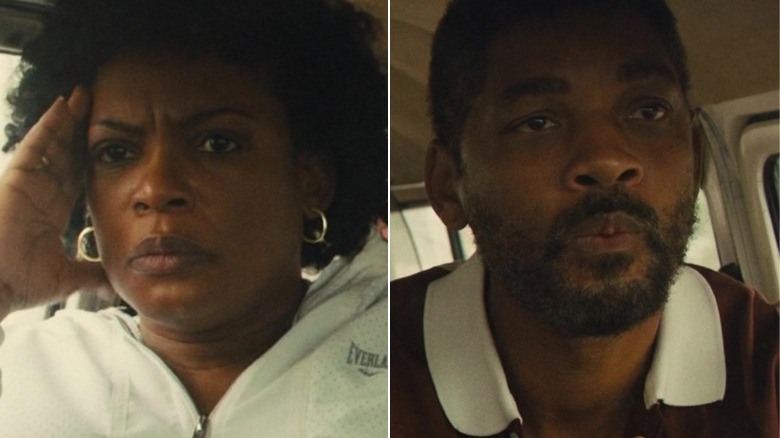Everything King Richard Doesn't Tell You About The True Story
The Oscar-winning "King Richard" is an unusual biopic. Rather than focusing on star athletes Venus and Serena Williams, the film is largely about their family unit and their father, Richard Williams, who dreamed of making his two daughters into tennis champions. Richard was a polarizing figure in the tennis world. He hyped his daughters to the public and press as Don King did for his fighters. Although his enthusiasm often appeared manic, his daughters have dominated women's tennis for decades, proving that his ambitions and vision for them weren't unfounded.
Like any public figure or famous family, the Williams had seen a lot of scripts over the years hoping to depict their family's triumphant story. Still, when Isha Price, Venus and Serena's older half-sister, saw the script for this film, she saw something that depicted her stepfather, faults and all, without vilifying him. Director Reinaldo Marcus Green told The Los Angeles Times, "He was sort of a controversial figure, which is very rich in terms of storytelling. But what was really interesting was hearing the family's perspective and knowing the love, time, and commitment that Richard and Oracene gave to those girls."
Isha Price signed on as an executive producer on the film, with Venus and Serena Williams joining her after they were satisfied with the script (per Vanity Fair). Because of the family's involvement, "King Richard" is rich in nuance and fairly accurate to life. Still, after watching, you may be wondering just how true the movie is in its details. Keep reading to learn what the film doesn't tell you about the true story.
The film glosses over Richard's other family
In one of the more intense arguments between Richard (Will Smith) and Oracene (Aunjanue Ellis) in "King Richard," Oracene brings up Richard's other children from his first marriage, whose existence she didn't know about until Richard III showed up at their door. Isha Price told Vanity Fair, "She [Oracene] welcomed [Richard III] into our home. He has a daughter that ended up living with us for a while." Still, Richard's children from his previous life aren't mentioned again in the film.
Thematically, the importance of the argument is Richard not having follow-through, walking away from projects and people, rather than being specifically about Richard's first family. Still, the argument sparks curiosity about what family Oracene is talking about. As reported by The Sun, Richard married Betty Johnson in the early '60s and they had five children together: Sabrina, Richard III, Ronner, Reluss, and Reneeka.
Sabrina Williams told The Sun that her father left one day, saying he was going to buy her a bike, and never came home. "I had two childhoods, the childhood from one to eight was fantastic," she said. "But once he left, within a year, we became very poor. There wasn't always meals on the table. We went downhill." Sabrina has also accused her father of not paying child support to her mother and having multiple illegitimate children, saying, "My mom always argued with my dad about his affairs, he was a serial cheat."
Oracene 'Brandy' Price wasn't enthusiastic about having more children
Oracene "Brandy" Price (Aunjanue Ellis) is surely the underappreciated backbone of the Williams-Price family in "King Richard." She works tirelessly as a nurse to support her family, training Serena remaining the practical parent while Richard is the dreamer. As we learn in the film, Oracene was married before she met Richard, having three daughters from her first marriage: Tunde Price (Mikayla Lashae Bartholomew), Isha Price (Daniele Lawson), and Lyndrea Price (Layla Crawford). Apparently, Oracene wasn't so enthusiastic about Richard's plans to have two more children. Williams has admitted to some pretty wild things over the years, including setting a house on fire when he was a boy (via The New Yorker), but his frank admission of how his daughters were born is one of the weirdest.
As reported by Time Magazine, Williams admitted to tampering with Brandy's birth control pills on the Today Show during an interview with Matt Lauer. Williams boasted about how Venus and Serena came to be saying, "I went to my wife and I said, 'We have to make two more kids,' and she didn't want to do it. So I used to take her out on dates, and I'd hide her birth-control pills. That's how Venus came. With Serena, what I'd do with my wife when I'd take her out is make sure that she had her birth-control pills. I'd tell my buddy, 'You know we're from the ghetto, right? You ... take her purse.' And I'd calm her down, and that's how Serena came."
Playing tennis was a family activity in the Williams-Price household
As the story goes, Richard decided to create two tennis superstars after seeing the winner of a women's match would walk away with $30,000 or $40,000. Richard first learned how to play tennis and then he taught Oracene, who was also quite athletic, having played basketball and volleyball in her youth. "It was like a family recreation early on. I myself learned to play in a year," Oracene told The New York Times. "I always wanted to learn and to learn the right way, like a professional. And Richard would show everyone my backhand." Venus and Serena's open stance came from Oracene, modifying her stance to play while she was pregnant with Venus.
As reported by The New York Times, Oracene and Richard first began teaching her three daughters, Tunde, Isha, and Lyndrea, before Venus and Serena began training as small children. Isha was a talented player, but back pain stopped her from continuing with the sport. Lyndrea reportedly played tennis in college, while Tunde wasn't gifted with athleticism as her sisters were.
What began as a family pastime and Richard Williams' personal obsession soon became a family endeavor, with everyone dedicated to the future success of Venus and Serena as we saw in the film. Isha Price told The New York Times, "Life was get up, 6 o'clock in the morning, go to the tennis court, before school. After school, go to tennis," emphasizing the consistent effort it took to turn Venus and Serena into tennis prodigies.
The film condenses the timeframe of the girls getting professional coaches and dominating junior competitions
As many biopics do, "King Richard" condenses some of its timeline, summing up the years the Williams sisters spent training before getting professional coaches and entering junior competitions, and later quitting the circuit to train in Florida with Rick Macci (Jon Bernthal).
In real life, Venus started training with Paul Cohen when she was just seven years old and Serena was only six, certainly younger than the actresses who depict the sisters in the film. Per Bleacher Report, after meeting Venus and Serena, Cohen said, "I had never seen a six-year-old as strong as Serena and I'd never seen a potential woman champion as athletic and as graceful as Venus." By July 1990, The New York Times had called Venus Williams a "hot prospect" as the 10-year-old had won her 17th junior singles title in less than a year.
As depicted in the film, Richard pulled the girls out of junior competitions, but unlike in the film, the girls were only 10 and 11 years old and had already received national attention (via Bleacher Report). It isn't unusual to condense true stories in order to make a story fit into a feature film runtime, but in "King Richard" this manipulation of time suggests an instant rise to fame, while in reality Venus and Serena Williams had been playing tennis for half their lives by the time they went pro.
Richard Williams hired school children to heckle the girls when they were practicing tennis
Although this was not depicted in "King Richard," one of Richard Williams' many morally questionable (but undeniably creative) training tactics was to hire school children to heckle the girls while they practiced tennis on the courts in Compton (per Slate). Williams didn't just train the girls in technique — part of his reasoning for his many strange tactics was that he wanted his daughters to be mentally tough.
Venus and Serena were born in Long Beach, but when they were just toddlers, Richard moved his family to Compton, California. In his memoir, "Black and White: The Way I See It," Williams wrote, "What led me to Compton was my belief that the greatest champions came out of the Ghetto. I had studied sports successes like Muhammad Ali and great thinkers like Malcolm X. I saw where they came from."
In an interview with CNN, Williams defended his unusual training tactics, like bussing in school children to hurl insults at his daughters. "In order to be successful you must prepare for the unexpected — and I wanted to prepare for that," he said. "Criticism can bring the best out of you." Williams may have been a polarizing figure in tennis, but his fervent desire to foster mental toughness in his daughters may have made the difference between becoming a technically skilled player and a champion.
Richard's gang confrontations didn't go down like in the movie
Richard Williams took more than one beating from gang members while trying to secure the tennis courts in Compton for his daughters to practice. Over the years, Williams sustained multiple injuries, breaking bones and even losing teeth, as he details in his memoir. "To this day [I] wear my 'toothlessness' as a badge of courage," he wrote (per Slate). After one particular beating, Williams went back to look for the young men with a weapon. He eventually started taking a shotgun to the tennis courts as a statement and for protection.
In the film, Richard has his pistol from work trained on one of the young men who attack him, when suddenly the gang member is gunned down in a drive-by. In his memoir, Williams said he had taken a 12-gauge shotgun to the tennis courts, and went looking for the gang members with the shotgun but returned home when he couldn't find any of the young men. It was on his drive home he saw one of the men who attacked him lying dead in the street surrounded by law enforcement (per Slate).
Richard Williams ran a private security business
As depicted in "King Richard," Richard Williams worked as a security guard, but the movie leaves out that he actually opened his own private security business, Sampson Security (per The New York Times). According to History vs. Hollywood and Williams' own memoir, he first worked for other companies, but after getting licensed, he opened his own firm based out of Compton, with contracts throughout the Los Angeles area. At one point, Williams said he had around 50 people working for him.
Another thing that's not addressed directly in the film is that Williams quit his job to focus on training Venus and Serena. As reported by People, Venus and Serena think of their mother as the "backbone" of the family, giving her credit for supporting their family financially when Richard decided he wouldn't work anymore.
At the "Red Table Talk" featuring Will Smith and her sister Venus, Serena recalled, "My dad at one point was working and then, he stopped. He's like, 'This is what we're going to do. I'm not going to have a job. I'm gonna go with Venus and Serena, and train them every day.' Now that would be impossible for me if my husband [Alexis Ohanian] were to tell me that."
Richard Williams forbade his daughters from dating
Richard Williams' efforts to keep the girls focused on tennis rather than boys and babies started early. According to The New Yorker, Williams ripped the heads off dolls to dissuade any inclinations toward early motherhood in both Venus and Serena. But Williams' tactics to keep the girls focused weren't limited to dolls. As reported by The New York Times, Williams forbade Venus from dating until she turned 21, saying, "She's not ready until then."
Maybe this didn't feel like a sacrifice to Venus, but it's hard to imagine any teenage girl not balking at restriction. Still, Venus clearly values her freedom and enjoys being a single, independent woman. "I have a lot of friends who don't believe me when I say that I like my life and I don't want to change it for any reason," she told Cosmopolitan in 2021. "I'm not desperate and they don't believe me. They say things like, 'You're going to miss your window.' I'm like, 'Please, relax. You might feel this way, but I don't. I promise you I don't.'"
Serena, on the other hand, wanted a family. She met her husband Alexis Ohanian in Rome in 2015, and they were engaged in 2016. Soon after the engagement, they learned they were expecting. Their daughter, Alexis Olympia Ohanian Jr. Was born in 2017. The couple wed in New Orleans a few months after their daughter was born (per Brides). In 2017 Serena told Vogue, "Now that I'm 36 and I look at my baby, I remember that this was also one of my goals when I was little, before tennis took over, when I was still kind of a normal girl who played with dolls."
The film left out the tragic way Yetunde Price died
Venus and Serena's sister Yetunde Price died in a drive-by shooting in Compton on September 14, 2003. After Tunde's death, Serena's publicist gave a statement, saying, "We are extremely shocked, saddened and devastated by the shooting death of our beloved Yetunde. She was our nucleus and our rock. She was personal assistant, confidant and advisor to her sisters, and her death leaves a void that can never be filled."
Initially, the shooting was suspected to have gang ties, something denied by Yetunde's boyfriend, Rolland Wormley. "These guys just started opening fire. We were just innocent passersby," he told The Los Angeles Times. Ultimately, the murder was believed to be a tragic case of mistaken identity (per Bustle). As reported by People, Robert Edward Mayfield was sentenced to 15 years in prison for Yetunde's murder in 2006, but was released early for good behavior in 2018.
Remembering Yetunde was the hardest part of being involved in and watching "King Richard" for the Williams-Price sisters. "Oh, I think I cried the whole time," Serena said during Will Smith's takeover of "Red Table Talk" on Facebook, "whenever she [Yetunde Price] came on film." Isha Price, who was a liaison between the family and the film's production, told Vanity Fair, "You just start to feel like she should be here to tell her own story — the fact that it has to be told through us, that was the challenging part."
Richard and Oracene divorced in 2002
"King Richard" certainly doesn't shy away from the tensions between Richard Williams and his wife Oracene Price. They argue about Richard's tough love tactics when he tries to leave the girls at a store to walk home because he believes they're being boastful. They also argue about Richard's lack of follow-through and how controlling he is over the girls' future. What the biopic doesn't tell you is that Richard and Oracene divorced in 2002. We can't fault the film for not divulging this information, as its narrative ends years earlier with Venus Williams going pro at the Bank of the West Classic in 1994.
As Venus and Serena's tennis careers blossomed, the marriage between Richard and Oracene disintegrated. By 2000 Oracene was no longer living with Richard, and by 2002 she had filed for divorce, citing irreconcilable differences (per Parlé). This divorce came after allegations of domestic abuse. As reported by The Tampa Bay Times, officials from a hospital in Florida contacted authorities after treating Oracene for three broken ribs. Richard denied these allegations, telling The Tampa Bay Times, "So far, I have only proven to be a good husband, I have a good wife and I am a good father." Oracene, however, reaffirmed the allegations, telling a deputy, "I know you know what happened, but I am fearful for my daughters' careers."
If we look back on the altercation depicted between Richard and Oracene in "King Richard" we could already see the cracks appearing in their partnership. In the film, Oracene flat out tells Richard she would have already left if it was only about her, but Oracene was committed to her children and the dream Richard had built around making their daughters into tennis champions.
